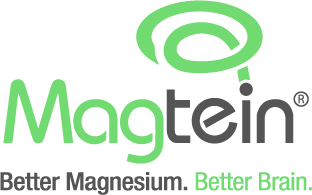Why Cognitive Support Matters During Finals
Finals season brings intense focus, long study hours, and heightened stress – conditions that challenge both the brain and body. Mental fatigue, disrupted sleep, and fluctuating energy levels can make it harder to retain information or perform under pressure. While students often turn to caffeine or stimulants for quick relief, these temporary boosts can also lead to energy crashes, anxiety, or restless nights.
Instead, supporting the brain’s natural processes for focus, learning, and recovery provides a more sustainable edge. Nutrients that enhance synaptic efficiency and relaxation – like magnesium L-threonate (Magtein) – can help the mind stay sharp while maintaining calm, balanced energy throughout the exam period.*

How Magtein Supports Student Focus
Magtein (magnesium L-threonate) is a unique form of magnesium developed by MIT researchers to raise magnesium levels specifically within the brain. Unlike other magnesium salts that act primarily in the gut or muscles, Magtein crosses the blood-brain barrier – enhancing neuronal communication and supporting the foundation of learning and memory.*
1. Enhances Learning and Memory Formation
Inside the brain, magnesium regulates NMDA and AMPA receptors – critical for synaptic plasticity, or the ability of neurons to strengthen and form new connections. During high-demand periods such as finals, these processes determine how efficiently information is learned and recalled. Maintaining optimal magnesium levels can help the brain process new material more effectively and consolidate memories during sleep.*
2. Promotes Calm Concentration
Excessive neural stimulation can lead to distraction, irritability, or “mental fog.” Magnesium helps stabilize excitatory neurotransmitters like glutamate and supports the production of GABA (gamma-aminobutyric acid), the brain’s main calming messenger. As a result, Magtein helps maintain focus without overstimulation, supporting calm alertness during study sessions and exams.*
3. Reduces the Effects of Academic Stress
Intense study routines can elevate cortisol levels and deplete magnesium stores. Research shows that magnesium plays a key role in regulating the hypothalamic-pituitary-adrenal (HPA) axis, the body’s stress-response system. By replenishing magnesium, Magtein supports a balanced physiological response to academic stress – helping students remain composed and resilient through long exam periods.*

Timing Magtein for Maximum Focus and Recovery
- Morning Use: Taking Magtein in the morning supports focus, cognitive performance, and task retention throughout the day. Pair it with breakfast for improved absorption and steady energy.*
- Evening Use: For students who struggle with restlessness, taking Magtein 30-60 minutes before bedtime may promote relaxation and improve sleep quality. Deep sleep consolidates memory and prepares the brain for next-day learning.*
- Consistent Daily Use: Regular intake maintains stable brain magnesium levels, supporting cumulative benefits for learning and mental clarity.*
Synergistic Study Habits for Brain Performance
Magtein works best as part of a holistic approach to learning and recovery. To optimize cognitive performance during finals week, combine magnesium support with evidence-based study and lifestyle strategies:
- Structured Study Blocks: Focused, time-bound sessions (such as 50-minute blocks) help reduce burnout and maintain retention.
- Sleep Optimization: Deep sleep is essential for memory consolidation and neural repair. Aim for 7-9 hours nightly to reinforce magnesium-dependent brain recovery.*
- Nutrition for Cognitive Endurance: Prioritize whole grains, leafy greens, and omega-3-rich foods like salmon or walnuts. These supply essential nutrients for energy metabolism and brain cell integrity.*
- Movement and Microbreaks: Light physical activity increases cerebral blood flow and relieves tension, helping reset focus between study periods.

The Student Advantage: Brain Health Beyond Exams
While Magtein is often highlighted for its role in focus and memory, its benefits extend well beyond finals week. Maintaining optimal brain magnesium levels supports clarity, learning efficiency, and cognitive flexibility long-term. Students who build these habits early can cultivate greater mental resilience and academic confidence – skills that translate to lifelong performance and well-being.*
Summary: Smarter Study, Stronger Focus
Academic performance depends not only on hard work but also on how effectively the brain functions under stress. Magtein provides nutritional support for focus, calm energy, and cognitive clarity – helping students learn efficiently, recall accurately, and rest deeply when it matters most. By pairing magnesium support with smart study habits and restorative sleep, students can optimize both mental endurance and overall well-being during finals season – and beyond.*
References
- Slutsky I, Abumaria N, Wu LJ, et al. Enhancement of learning and memory by elevating brain magnesium. Neuron. 2010;65(2):165-177.
- Liu G, Weinger JG, Lu ZL, Xue F, Sadeghpour S. Efficacy and Safety of MMFS-01, a Synapse Density Enhancer, for Treating Cognitive Impairment in Older Adults: A Randomized, Double-Blind, Placebo-Controlled Trial. J Alzheimers Dis. 2016;49(4):971-990. doi:10.3233/JAD-150538
- Hausenblas HA, Lynch T, Hooper S, Shrestha A, Rosendale D, Gu J. Magnesium-L-threonate improves sleep quality and daytime functioning in adults with self-reported sleep problems: A randomized controlled trial. Sleep Med X. 2024;8:100121. Published 2024 Aug 17. doi:10.1016/j.sleepx.2024.100121
- Hewlings SJ, Kalman DS. A randomized, double-blind, placebo-controlled, comparator trial evaluating Magtein® magnesium supplement on quality of life as related to levels of stress, anxiety, fear and other indicators. J Am Coll Nutr. 2022;41(7):673-683.
These statements have not been evaluated by the Food and Drug Administration. This product is not intended to diagnose, treat, cure, or prevent any disease.



